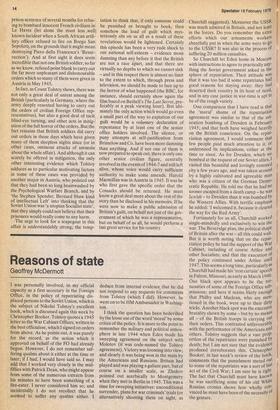Reasons of state
Geoffrey McDermott
I was personally involved, in my official capacity as a first secretary in the Foreign Office, in the policy of repatriating displaced persons to the Soviet Union, which is the subject of Nikolai Tolstoy's excellent book, which is discussed again this week by Christopher Booker. Tolstoy quotes a 1945 letter to the War Cabinet Offices, written in the best officialese, which! signed on orders from above. As he points out, it was purely for the record, as the action which it approved on behalf of the FO had already begun. However, I do not remember suffering qualms about it either at the time or later; if I had, I would have said so. I may add that I worked very closely in the midfifties with Patrick Dean, who might appear from some of the numerous extracts from his minutes to have been something of a fire-eater. I never considered him so; and incidentally I do not recollect that he seemed to suffer any qualms either. I deduce from internal evidence that he did not respond to any requests for comments from Tolstoy (which I did). However, he went on to be HM Ambassador in Washington.
I think the question has been bedevilled by the loose use of the word 'moral' by some critics of the policy. It is more to the point to remember the military and political atmosphere in late 1944 when Eden made his sweeping agreement on the subject with Molotov (it was code-named the Tolstoy agreement). Victory was looming into view; and clearly it was being won in the main by the Americans and Russians. Britain had played and was playing a gallant part, but of course on a smaller scale, as Zhukov pointed out acerbically to Montgomery when they met in Berlin in 1945. This was a time for sweeping initiatives: unconditional surrender, plans for war criminals' trials (or alternatively shooting them on sight, as Churchill suggested). Moreover the USSR was much admired in Britain, and not least in the forces. Do you remember the extra efforts which our armaments workers cheerfully put in when the arms were to go to the USSR? It was also in the process of suffering 20 million casualties.
So Churchill let Eden loose in Moscow with instructions to agree to practically anything the Soviet government asked in the sphere of repatriation. Their attitude was that it was too bad if some repatriates had good reasons for staying away: they had deserted their country In its hour of need, and in any case justice in war-time is apt to be of the rough variety.
One comparison that I have read is that the 'moral' shame of the repatriation agreement was similar to that of the saturation bombing of Dresden in February 1945; and that both have weighed heavily on the British conscience. On the repatriation agreement, I would comment that few people paid much attention to it, or understood its implications, either at the time or since. As for Dresden, which we bombed at the request of our Soviet allies, visited this beautiful and lovingly restored city a few years ago, and was taken around by a highly cultivated and agreeable man who was a citizen of the German Democratic Republic. He told me that he had no sooner escaped from a death camp — he was Jewish — to Dresden than it was bombed by the Western Allies. With terrific emphasis he added: 'I welcomed it, because it cleared the way for the Red Army'. . Fortunately for us all, Churchill worked single-mindedly and exclusively to 'win the war. The Beveridge plan, the political shape of Britain after the war — all this could wait. But it is worth noting that on the rePat" nation policy he had the support of the War Cabinet, including of course Attlee and other Socialists; and that the execution 0! the policy continued under Attlee until 1947. This seems a longtime, particularly as Churchill had made his 'iron curtain' speech in Fulton, Missouri, as early as March 1946. One black spot appears to be the tor. tuosities of some of the Foreign Office sub' missions; and here it seems likely enough that Philby and Maclean, who are mentioned in the book, were up to their dirtY tricks. Another black spot was the excessive brutality shown by some — but by no means all — of the British troops in carrying out their orders. This contrasted unfavourablY with the performance of the Americans and others. Tolstoy suggests that a vast proP' ortion of the repatriates were punished bY death; but I am not sure that the evidence produced corroborates this. Christopher Booker, in last week's review of the book, comments that the punishment meted out to some of the repatriates was a sort of last act of the Civil War; I am sure he is right. The fact that Churchill must have knoWn he was sacrificing some of his old White Russian cronies shows how wholly convinced he must have been of the necessity of the gesture.


































 Previous page
Previous page